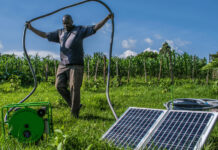By Sasha Wainaina
SEATTLE, USA: In its eighth annual Goalkeepers report unveiled today, the Bill & Melinda Gates Foundation (BMGF) called upon world leaders to enhance international healthcare investments in regions with the greatest need. This emphasis aims to improve children’s health and nutrition, particularly in light of the worldwide climate crisis.
The Goalkeepers report, titled “A Race to Nourish a Warming World,” predicts a dire future if immediate global action is not taken. Without intervention, climate change will result in an additional 40 million children suffering from stunting and 28 million more experiencing wasting between 2024 and 2050.
However, by implementing solutions now, we can avert this outcome and build resilience to climate change. Moreover, these actions would stimulate much-needed economic growth.
New modeling shows 40 million more children will suffer from hunger’s worst effects by 2050 due to climate change, but immediate action could instead boost health, spur economic growth
In 2023, the World Health Organization estimated that 148 million children have experienced stunting, a serious condition preventing children from reaching their full physical and mental potential.
Additionally, 45 million children have experienced wasting, a condition characterized by extreme weakness and thinness, substantially increasing the risk of developmental delays and death. These represent the most severe and irreversible forms of chronic and acute malnutrition.
Amidst escalating global challenges, the proportion of foreign aid allocated to Africa has significantly diminished. In 2010, 40% of foreign aid was directed towards African nations. However, this figure has plummeted to a mere 25%, representing the lowest percentage in the last two decades.
This concerning trend, despite over half of all child deaths occurring in sub-Saharan Africa, puts hundreds of millions of children at grave risk of perishing or suffering from preventable diseases. Moreover, it jeopardizes the remarkable progress in global health achieved across Africa between 2000 and 2020.
“Today, the world is contending with more challenges than at any point in my adult life: inflation, debt, new wars. Unfortunately, aid isn’t keeping pace with these needs, particularly in the places that need it the most,” Bill Gates, co-chair of the Bill & Melinda Gates Foundation, notes in the report.
Adding “I think we can give global health a second act—even in a world where competing challenges require governments to stretch their budgets.”
 According to Gates, malnutrition is “the world’s worst child health crisis,” and climate change is only making it worse. Amidst this crisis, Gates calls for maintaining global health funding; immediately addressing the growing threat of child malnutrition by supporting the Child Nutrition Fund.
According to Gates, malnutrition is “the world’s worst child health crisis,” and climate change is only making it worse. Amidst this crisis, Gates calls for maintaining global health funding; immediately addressing the growing threat of child malnutrition by supporting the Child Nutrition Fund.
A new platform that coordinates donor financing for nutrition; and governments fully funding the established institutions that have proven effective at protecting millions of lives each year.
These institutions include Gavi, the Vaccine Alliance, which is due to hold its next funding replenishment in 2025; and the Global Fund to Fight AIDS, Tuberculosis and Malaria, which is expected to also hold its replenishment next year.
“If we do these three things, we won’t just usher in a new global health boom and save millions of lives—we’ll also prove that humanity can still rise to meet our greatest challenges,” Gates writes.
The report uncovers the devastating economic impact of malnutrition, emphasizing viable solutions to alleviate it. The World Bank estimates that undernutrition costs US$3 trillion in lost productivity annually, as it impairs both physical and cognitive capabilities. In low-income countries, this loss represents a substantial portion of their GDP, ranging from 3% to 16% (or more). This translates to an ongoing global recession on par with the 2008 economic crisis, occurring every year.
“The best way to fight the impacts of climate change is by investing in nutrition. Malnutrition makes every forward step our species wants to take heavier and harder,” Gates writes.
“But the inverse is also true. If we solve malnutrition, we make it easier to solve every other problem. We solve extreme poverty. Vaccines are more effective. And deadly diseases like malaria and pneumonia has become far less fatal” he adds.














